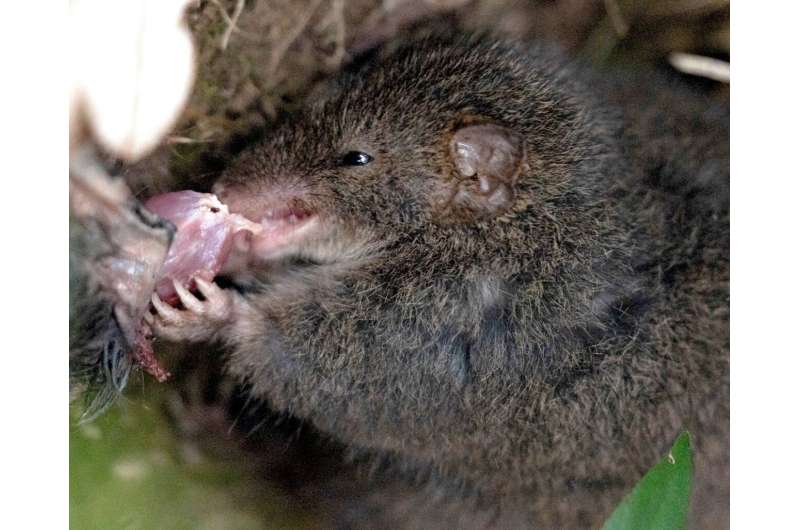
The mouse-sized marsupial famed for its mighty mating until it dies has now been observed eating its own dead.
Antechinuses are carnivorous marsupials well-known for suicidal sex sessions where all males die after the 1–3 week breeding period, according to Associate Professor Andrew Baker from QUT School of Biology and Environmental Science.
“Cannibalism in the mainland dusky antechinus (Antechinus mimetes mimetes) during the breeding period” was published in Australian Mammalogy and involved a research team including Elliot Bowerman (Sunshine Coast Council) and Dr. Ian Gynther (Department of Environment, Science and Innovation).
“During the breeding season, male and females mate promiscuously in frenzied bouts lasting as long as 14 hours. Certain stress-induced death follows for all males as surging testosterone causes cortisol to flood uncontrolled through the body, reaching pathological levels,” Professor Baker said.
“The males drop dead, which provides an opportunity for cheap energy gain via cannibalism for still-living males and pregnant or lactating female antechinuses.
“While cannibalistic behavior has been reported in some dasyurids (the family which includes antechinuses, quolls and Tasmanian devils), it is very rare to observe in the wild.”
The photos of a mainland dusky antechinus (Antechinus mimetes) eating a dead member of its own species were taken on a trek to Point Lookout in New England National Park, NSW in August 2023.
Professor Baker said both the eaten and the eater in the photos were identified as mainland dusky antechinuses based on a combination of body size, foreclaw length, small ears and eyes, fur color and shagginess, along with the capture location.
“In places such as Point Lookout where two antechinus species (Antechinus mimetes and the brown antechinus, A. stuartii) are living in the same area, the two slightly separated breeding periods provide the opportunity to cannibalize both their own and the other species.
“Each species may benefit from eating dead males of the other.
“For the earlier-breeding antechinus species, it may mean that pregnant and lactating females can get high-energy food by cannibalizing the males of the later-breeding species as they die off.
“For the later-breeding species, both sexes may take the opportunity to cannibalize dead males of the earlier-breeding species, to help stack on weight and condition before their own breeding period commences.
“In the present study, the sex of the animal eating the dead antechinus is uncertain but it is most likely a male. Although males are believed to eat less than females during breeding, both sexes are known to eat at that time.
“The antechinus seen feeding on its dead comrade appeared vigorous and large-bodied, but it had damage to its right eye and hair loss on its arms and shoulders, which is associated with stress-induced decline in males. He was perhaps destined soon to become somebody else’s meal.”
More information:
Andrew M. Baker et al, Cannibalism in the mainland dusky antechinus (Antechinus mimetes mimetes) during the breeding period, Australian Mammalogy (2024). DOI: 10.1071/AM23042
Citation:
Study provides rare field-based evidence of opportunistic cannibalism in mini marsupial (2024, January 18)
retrieved 18 January 2024
from https://phys.org/news/2024-01-rare-field-based-evidence-opportunistic.html
This document is subject to copyright. Apart from any fair dealing for the purpose of private study or research, no
part may be reproduced without the written permission. The content is provided for information purposes only.







